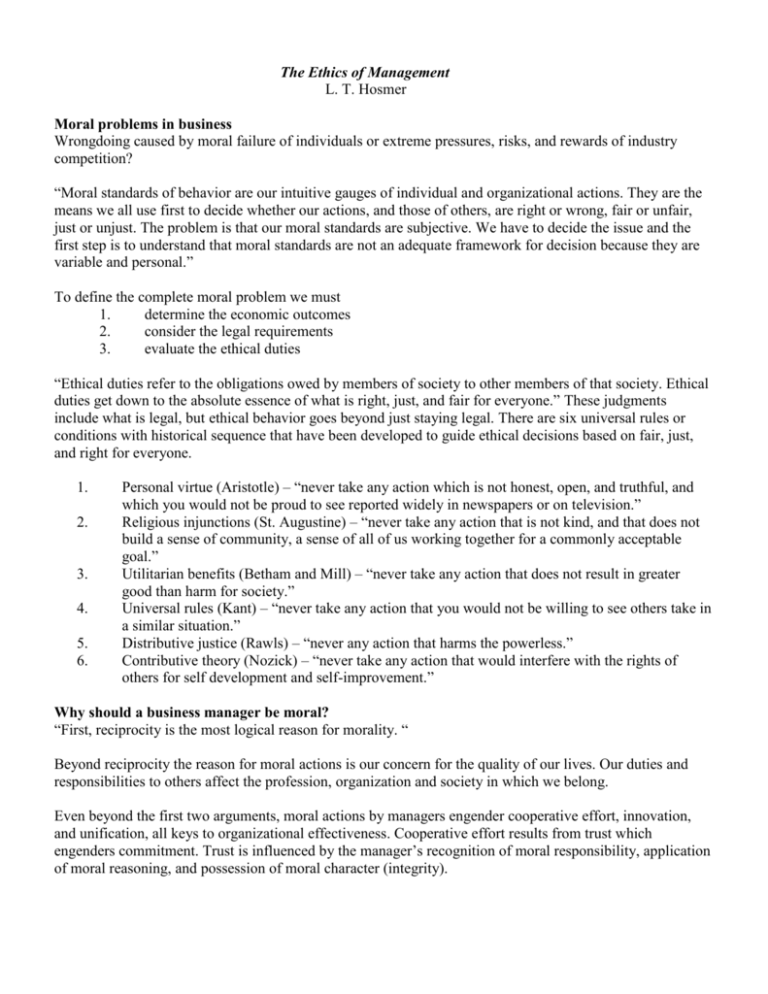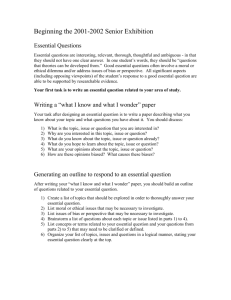The Ethics of Management
advertisement

The Ethics of Management L. T. Hosmer Moral problems in business Wrongdoing caused by moral failure of individuals or extreme pressures, risks, and rewards of industry competition? “Moral standards of behavior are our intuitive gauges of individual and organizational actions. They are the means we all use first to decide whether our actions, and those of others, are right or wrong, fair or unfair, just or unjust. The problem is that our moral standards are subjective. We have to decide the issue and the first step is to understand that moral standards are not an adequate framework for decision because they are variable and personal.” To define the complete moral problem we must 1. determine the economic outcomes 2. consider the legal requirements 3. evaluate the ethical duties “Ethical duties refer to the obligations owed by members of society to other members of that society. Ethical duties get down to the absolute essence of what is right, just, and fair for everyone.” These judgments include what is legal, but ethical behavior goes beyond just staying legal. There are six universal rules or conditions with historical sequence that have been developed to guide ethical decisions based on fair, just, and right for everyone. 1. 2. 3. 4. 5. 6. Personal virtue (Aristotle) – “never take any action which is not honest, open, and truthful, and which you would not be proud to see reported widely in newspapers or on television.” Religious injunctions (St. Augustine) – “never take any action that is not kind, and that does not build a sense of community, a sense of all of us working together for a commonly acceptable goal.” Utilitarian benefits (Betham and Mill) – “never take any action that does not result in greater good than harm for society.” Universal rules (Kant) – “never take any action that you would not be willing to see others take in a similar situation.” Distributive justice (Rawls) – “never any action that harms the powerless.” Contributive theory (Nozick) – “never take any action that would interfere with the rights of others for self development and self-improvement.” Why should a business manager be moral? “First, reciprocity is the most logical reason for morality. “ Beyond reciprocity the reason for moral actions is our concern for the quality of our lives. Our duties and responsibilities to others affect the profession, organization and society in which we belong. Even beyond the first two arguments, moral actions by managers engender cooperative effort, innovation, and unification, all keys to organizational effectiveness. Cooperative effort results from trust which engenders commitment. Trust is influenced by the manager’s recognition of moral responsibility, application of moral reasoning, and possession of moral character (integrity). Exam questions for assessment 1. Behaving ethically goes beyond A. reason B. staying within the law C. one’s job description D. pop culture 2. One of the complexities businesses face with regards to ethics is the rules that guide ethical decisions are A. outdated B. complicated C. subjective D. expensive 3. Many organizations behave unethically because they focus mainly on economic and legal consequences of their decisions and fail to consider A. their ethical duties B. historical precedents C. their customers reactions D. employee morale 4. Which of the following has been found to significantly influence ethical behavior in and by organizations? A. level of profits B. organizational culture C. rate of sales growth D. economic environment 5. Hosmer’s book on the Ethics of Management questions whether organizational “wrong doings” results from more from individuals’ moral failure or from A. Wall St corruption B. limited government oversight C. lack of training D. industry pressure, risks, and rewards 6. While ethics is considered honorable, Hosmer believes managers should behave ethically mainly because ethical behavior by managers A. ultimately costs less B. attracts better employees C. improves organizational effectiveness D. enhances management’s image 7. When Wal-mart decides to build a store in a rural area, one major ethical dilemma involves the harm caused to local businesses versus the benefit of lower prices for consumers in the community. The rule that governs this decision is A. Religious injunctions B. Utilitarian benefits C. Contributive theory D. Political autonomy 8. In the above Wal-Mart example, if one assumes that the local businesses are “powerless” against Wal-Mart, then they would see the above ethical guideline flawed because Wal-Mart’s placement of a store in the rural community violates the ethical guideline called A. Distributive justice B. Personal virtue C. Free enterprise D. Protectionism






